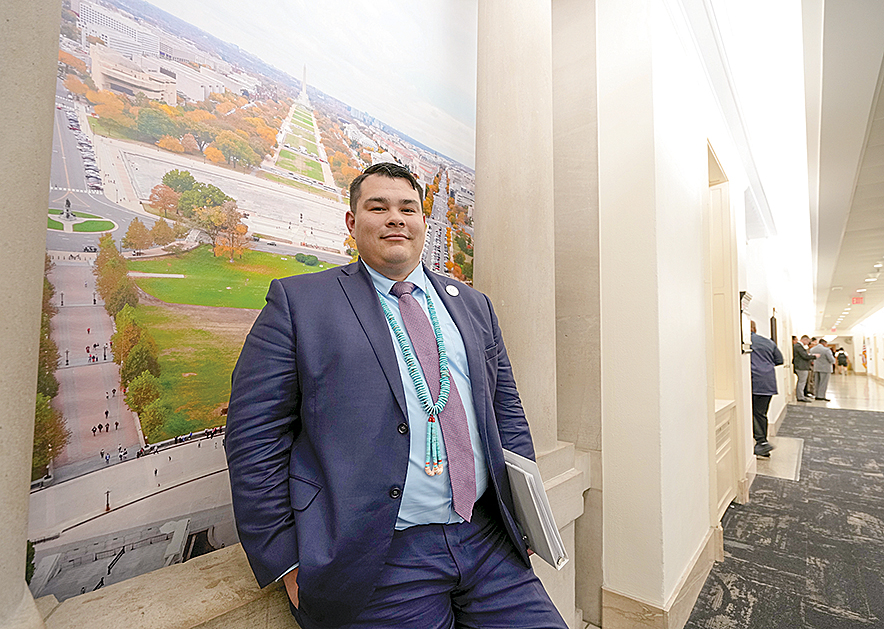
NNWO executive director said bettering lives of Diné is his mission

Navajo Times | Donovan Quintero
Justin Ahasteen, the Navajo Nation Washington Office executive director, poses for a photo against an illustration of the National Mall in Washington, D.C.
By Donovan Quintero
Special to the Times
WASHINGTON, D.C. — Its purpose: to represent the interests of the Navajo people at the federal level, advocate for policies that benefit the tribe, secure resources and support from the federal government, and ensure that the voices of the Navajo Nation are heard on key policy issues that affect the tribe.
That’s how Navajo Nation Washington Office Executive Director Justin Ahasteen, 28, describes the vital functions of the office and how it operates, which he’s headed since being appointed last year. Despite being over 2,000 miles away from the Navajo Nation, he said the office has been positively impacting its people back home.
Ahasteen, originally from White Cone, Arizona, took the time on Tuesday to talk about the Navajo Nation Washington Office, which was established in 1984.
Navajo’s Washington office in heart of capital
The Navajo Washington Office, located in the heart of the nation’s capital, serves as the primary advocacy and liaison office for the Navajo Nation government in Washington, D.C. It is responsible for representing the interests of the Navajo people at the federal level and ensuring that their voices are heard on key policy issues that affect the tribe.
Justin Ahasteen said the office’s work has been challenging due to the current political environment.
The job has been going, it’s been difficult, given the political dynamics here in Washington, D.C., obviously, a very polarized time between both chambers of Congress as well as the presidential administration,” he said on Tuesday. “So that makes the work a little more difficult, but we’ve been navigating as best as we can, and I think that we’ve had some significant accomplishments over the last several months.”
Ahasteen said he has nine staff members, along with eight interns, three of whom are Navajo. In their efforts, he said they’ve accomplished some of the portfolios they’ve been working on.
Particularly, they’ve made progress on the Radiation Exposure Compensation Act Amendments, despite the program ending a few weeks ago when House Republicans complained that the act with its new revisions were approved, would cost too much.
“It’s unfortunate of where it’s at right now, but that’s to be expected in a polarized Congress such as this, especially with concerns about the different types of costs and spending and ways to reduce and just the simple rules of requiring offsets in the (U.S.) House. Now that doesn’t mean that our legislative efforts have stopped,” he said. “Yes, the program (RECA) has ended, but there is still a few paths before the end of the fiscal year in order to get that project moving.”
Ahasteen described the office’s role in advocating for the Navajo Nation on a wide range of issues, including health care, education, economic development, and environmental protection. He emphasized that the office works tirelessly to promote the interests of the Navajo people and to secure resources and support from the federal government to address the unique challenges facing the tribe.
Advocating for Diné
Despite the physical distance between Washington, D.C., and the Navajo Nation, Ahasteen highlighted the office’s effectiveness in positively impacting the lives of Navajo people back home. Through advocacy efforts, policy initiatives, and strategic partnerships, the office has been instrumental in securing funding for crucial projects, advocating for legislative changes that benefit the tribe, and raising awareness about key issues affecting the Navajo Nation.
Justin Ahasteen expressed pride in the office’s accomplishments and emphasized the importance of maintaining a strong presence in Washington, D.C., to ensure that the Navajo Nation’s interests are represented and protected at the highest levels of government.
Staff members like Montaro Ramos from Sawmill, Arizona, who has been on staff for two months described the challenges of adjusting to living in the D.C. area.
“It’s taking some getting used to. I’m not used to all the trees, I’m used to being able to see the horizon like I can in Arizona,” he said. “So, here it gets dark kind of fast because the trees block the sun in the evening. And it’s a little cooler, which is nice. There’s a lot more rain but the humidity it’s still intense.”
Ramos said he manages the administrative functions of the office which include budgets, inventory, vendor profile maintenance, and ensuring compliance with the Navajo Nation administrative policies. In addition, he’s been assisting with other roles at the office.
“We’ve been moving offices. So, I’ve been handling, tracking our inventory for our insurance,” Ramos said.
Ahasteen said the office remains committed to advancing the tribe’s priorities, building strong relationships with federal stakeholders, and ensuring that the voices of the Navajo Nation are heard and respected.
“When I first came in, it was kind of a very slow-moving vehicle, and I dedicated a lot of time to that. I’ve been able to raise money to bring down the areas that have been affected,” he said.
Read the full story in the July 25, edition of the Navajo Times.








 Highway 264,
Highway 264, I-40, WB @ Winslow
I-40, WB @ Winslow